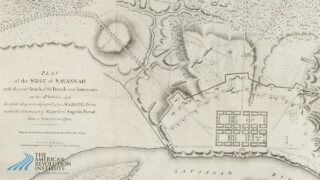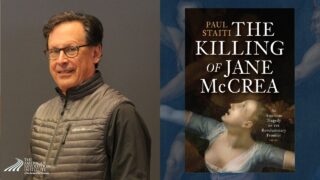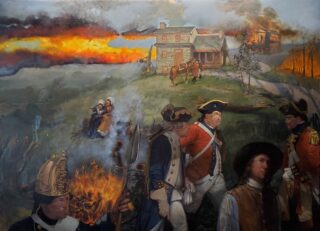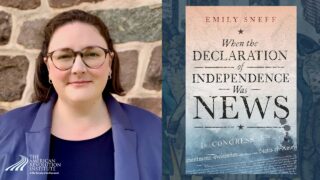Supporting scholarship and promoting popular understanding of the American Revolution is central to the work of the American Revolution Institute. The Institute welcomes distinguished scholars and authors to share their insights and discuss their latest research with the public at Anderson House through lectures, author's talks and panel discussions. The Institute also hosts a variety of other historical programs throughout the year, including our Lunch Bite object talks, battlefield tours, special Anderson House tour programs and other events. Many of the events we offer are free.

March 2026
Virtual Lecture— Loyalists & Liberty: Savannah in the American Revolution
Nora Fleming Lee, chief executive officer of the Coastal Heritage Society in Savannah, Ga., discusses the unexpected discovery of nineteen Revolutionary War cannons found in the Savannah River in 2021. Since the recovery of the cannons and other antiquities, the U.S. Army Corps of Engineers, George State Department of Natural Resources, and Coastal Heritage Society have joined forces to conserve the historic treasures. Upon completion of the conservation efforts, the cannons and other artifacts will be displayed in a new…
Find out more »Lecture—Rebels at Sea: Privateering in the American Revolution
Independent historian Eric Jay Dolin explores American privateers during the American Revolution. The heroic story of the founding of the U.S. Navy during the Revolution has been told before, yet missing from most maritime histories of the war is the ragtag fleet of private vessels that truly revealed the new nation’s character―above all, its ambition and entrepreneurial ethos. Drawing from his research, Dolin corrects that significant omission and contends that privateers, though often seen as profiteers at best and pirates at…
Find out more »Author’s Talk—The Killing of Jane McCrea: An American Tragedy on the Revolutionary Frontier
Paul Staiti, professor of fine arts at Mount Holyoke College, discusses his new book that, for the first time, undertakes a comprehensive investigation into the life, death, and legacy of Jane McCrea, who was killed by a Native American warrior serving alongside British general John Burgoyne’s 1777 expedition in New York. Using both visual arts and written records, Professor Staiti reassembles the scattered fragments of McCrea’s story to illuminate a historical terrain long since shrouded in misinformation, controversy, and mythology.…
Find out more »April 2026
“Destruction and Wanton Waste”: The Impact of War on a Peaceful Valley
Andrew Outten, historical programs manager for the American Revolution Institute, reexamines the Battle of Brandywine from the perspective of the civilian population that experienced the engagement, especially the predominant Quaker community. Drawing from the experiences of a several Quakers living on and around the battlefield—including Joseph Townsend, Gideon Gilpin and Benjamin Ring—this talk demonstrates the devastating effect of war on a local population by exploring British logistical challenges against the backdrop of the social, economic and religious history of eighteenth-century…
Find out more »Author’s Talk—When the Declaration of Independence Was News
Historian Emily Sneff discusses her new book that reveals the stories of how the Declaration of Independence was communicated in the United States and around the Atlantic World. In 1776, people could hear the Declaration of Independence proclaimed in public squares and read it in the pages of their local newspapers. Histories of the Declaration typically recount the work that took place inside the Continental Congress, focusing on the men tasked with drafting the text. Although Congress declared independence, the…
Find out more »



